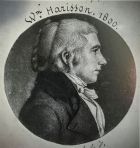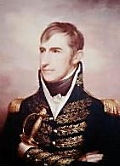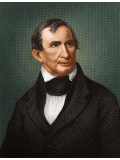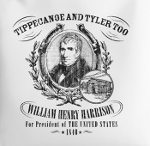William Henry Harrison: War Hero and President
America's ninth president was William Henry Harrison. A distinguished statesman and war hero, he had the shortest presidency in history. He was born on Feb. 9, 1773, at the Richmond-area family plantation Berkeley, in Virginia. William's father, Benjamin, had been a delegate to the Continental Congress, signed the Declaration of Independence, and served as Governor of Virginia from 1781 to 1784. He early took a liking to the outdoors and, after going to school at Hampden-Sydney College and studying to be a doctor at the University of Pennsylvania, left schooling in 1791 to join the Army. (His father had died that year, and Harrison was short on funds for further schooling.) An able soldier, he found success fighting against Native Americans on the frontier. One of this early successes was under the command of "Mad" Anthony Wayne in the Battle of Fallen Timbers, in 1794. This victory opened what is now Ohio to settlement by Americans coming from the East Coast. For his actions, Harrison was appointed to the rank of captain and was given command of Fort Washington, near what is today Cincinnati. 
In 1795, Harrison married Anna Symmes, the daughter of an Ohio judge and landowner. The couple had 10 children, one of whom was the father of President Benjamin Harrison. Harrison resigned his Army commission in 1798 and was later secretary of the Northwest Territory, a 1787 land creation that included much of what is today Illinois, Indiana, and Ohio. Harrison in 1799 was the first congressional delegate from the Northwest Territory and, the following year, was named Governor of the Indiana Territory, which had been created out of the Northwest Territory. One of Harrison's roles as governor of the Indiana Territory was to negotiate treaties with Native American tribes regarding settlement of land. 
Not all tribes wanted to sell their land or move from where they had been living for some time. The pinnacle of his wartime service was a victory in the Battle of Tippecanoe in 1811. This fierce struggle pitted Harrison's troops against a powerful force led by the Shawnee leader Tecumseh and his charismatic brother the Prophet. The battle, fought on November 7, was named for the river near where it was fought, and the Native Americans made the first move. Harrison's dead and wounded count were 190, but Tecumseh called off the attack and so Harrison termed it a victory. He took the nickname Tippecanoe from this victory and wore it as a mantle in subsequent political campaigns. Indeed, when he ran for president in 1840 (with running mate John Tyler), the slogan for their candidacies was "Tippecanoe and Tyler Too." Before that, though, Harrison re-enlisted to fight in the War of 1812. He went back in at the rank of brigadier general and was given command of the Army of the Northwest. Much fighting took place in and around the Great Lakes area. Harrison led a force that retook Detroit, which had been captured by British forces early in the war. Another of Harrison's triumphs was at the Battle of Thames, north of Lake Erie, near what is now Ontario, Canada, in 1813. Tecumseh was again Harrison's adversary; the Shawnee was among the dead when the battle was over. This victory, coupled with Tecumseh's death, effectively ended any kind of sustained Native American resistance in the Northwest. Harrison was promoted to major general and then, in 1814, resigned again and moved with him family to a North Bend, Ohio, farm. He then set about making a political career. In 1816, Ohio voters from the 1st District elected him to the House of Representatives; in 1819, they elected him to the Ohio State Senate. And in 1825, he served in the U.S. Senate. In 1828, he left the Senate to take up the post of Minister to Colombia. 
Harrison ran for President in 1836, as a candidate for the Whig Party. The Democratic nominee that year was the incumbent Vice-president Martin van Buren, who was riding on the coattails of the popular President Andrew Jackson. Harrison was one of four Whig candidates that year, and that split the vote such that van Buren was elected. Harrison won the most electoral votes of the four Whig candidates, the other three of whom were Willie Mangum, Daniel Webster, and Hugh White. 
The Whigs nominated just one candidate in 1840, Harrison. He easily won this election, and, at 68, was inaugurated on March 4, 1841. He gave a very long inauguration speech (at 105 minutes the longest in presidential history) in inclement weather, eschewing a hat and coat, and fell ill. He contracted pneumonia (some sources say typhoid fever) and died, on April 4, one month to the day since his inauguration. He was the first U.S. President to die in office. Other notes:
|
|
Social Studies for Kids
copyright 2002–2026
David White


